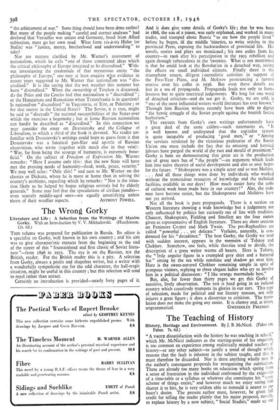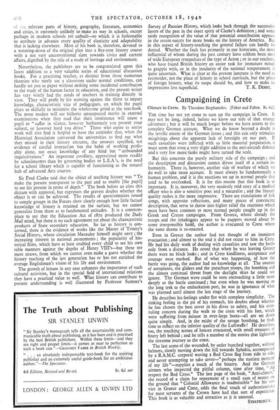The Teaching of History
"A VAGUE dissatisfaction with the history he was teaching in school," which Mr. McNicol indicates as the starting-point of his enquiries, is too common an experience among realistically minded teachers o' history—or any other subject—to justify a trend of thought which reasons that the fault is inherent in the subject taught, and that it must therefore be discarded. Nor is there anything wholly new in the author's consequent proposals for reorganising the curriculum. There are already too many books on education which spring from a sense of frustration in the individual confronted by, the exigencies of a time-table or a syllabus or whatever else constitutes his " sorry scheme of things entire," and however much we enjoy seeing him shatter it to bits, he is very seldom able to remould it nearer to our heart's desire. The present author must, however, be given full credit for telling the reader plainly that his major proposal, namely, to replace history by. a. new subject, " Social Studies," made up out
of the relevant parts of history, geography, literature, economics and civics, is extremely unlikely to make its way in schools, except perhaps in modern schools yet unbuilt—to which it is fashionable to attribute in advance every quality of elasticity and adaptability that is lacking elsewhere. Most of his book is, therefore, devoted to a watering-down of the original plan into a five-year history course with a not very unconventional slant towards civics and current affairs, dignified by the title of a study of heritage and environment.
Nevertheless, the publishers are to be congratulated upon this latest addition . to a very valuable series of educational discussion books. For a practising teacher, as distinct from those numerous theorists who rarely see a classroom under normal conditions, can hardly set pen to paper without making some incidental contribution to the study of the human factor in education, and the present Writer has very wisely had the needs of teachers in training directly in view. They will profit by his warning against the thirst to impart knowledge, characteristic vice of pedagogues, on which the pupil plays so skilfully to minimise the wholesome grind at the text-book. The more modest will see hitherto unsuspected merits in external examinations when they read that their imminence will cause a pupil to " suffer in silence, however barbarously you present your subject, or however hard you drive." Those who aspire to senior work will also find it helpful to have the reminder that, when the Historical Association canvassed the universities to find out what they missed in their -history entrants, the answers specified, not evidence of careful instruction but the habit of working profit- ably alone, not exact knowledge of any kind but " unbounded inquisitiveness." An important .corollary, appreciated more readily by schoolmasters than by governing bodies or L.E.A.'s, is the need for a school library which is capable of functioning as the natural hub of advanced Arts courses.
Sir Fred Clarke said that the object of teaching history was "To make the present transparent to the past and to enable [the pupil] to see his present in terms of depth." The book before us cites this dictum with approval, but expresses the gravest doubts whether the object is or can be achieved. The results of questionnaires issued to sample groups in the Forces show clearly enough how little factual knowledge of history is retained on the surface, but we cannot generalise from them as to fundamental attitudes. It is a common- place to say that the Education Act of 1870 produced the Daily Mail mind, but there is no such agreement yet about the characteristic products of State secondary education. So far as history is con- cerned, there is the evidence of works like the Master of Trinity's Social History, whose circulation Macaulay himself might envy ; the increasing interest in national .monuments ; the popularity of his- torical films, which have at least enabled every child to see his own table manners against the depths of Henry VIII's—but these are mere straws, from which we cannot even make a guess whether the history teaching of the last generation has or has not enriched the average Englishman's vision of his life and environment.
The growth of leisure in any case enhances the importance of such cultural activities, but in the special field of international relations they have a practical value as well. What history can contribute to present understanding is well illustrated by Professor Sumner's
Survey of Russian History, which looks back through the successive layers of the past in the exact spirit of Clarke's definition ; and some tardy recognition of the value of that potential contribution appears in the recent outcry for more books on the history of America. But in this aspect of history-teaching the general failure can hardly be denied. Whether the fault lies primarily in our historians, the most influential of whom during the past century have seldom been men of wide European sympathies of the type of Acton ; or in our teachers, who have found British history an easier task for immature minds to grapple with, or in the insularity of the national temperament it quite uncertain. What is clear at the present juncture is the need to reconsider, not the place of history in school curricula, but the place of foreign history, what its scope should be, and how to make its































 Previous page
Previous page